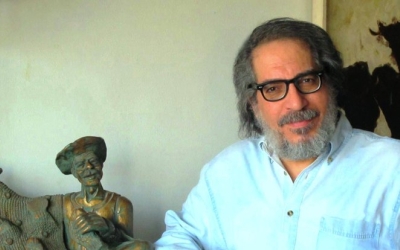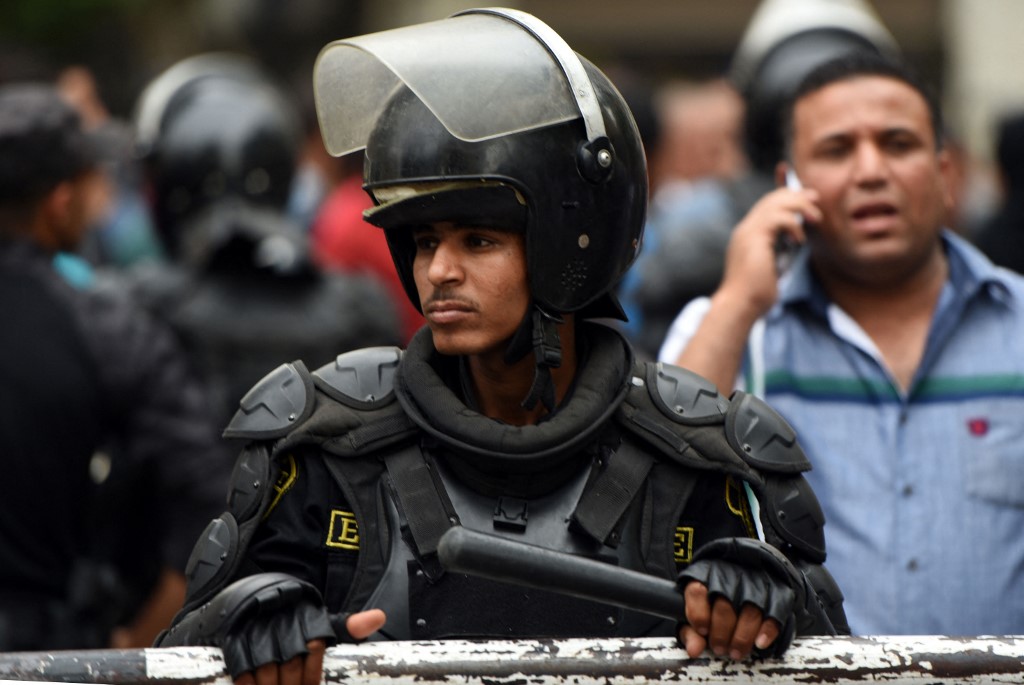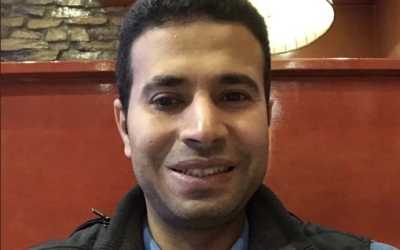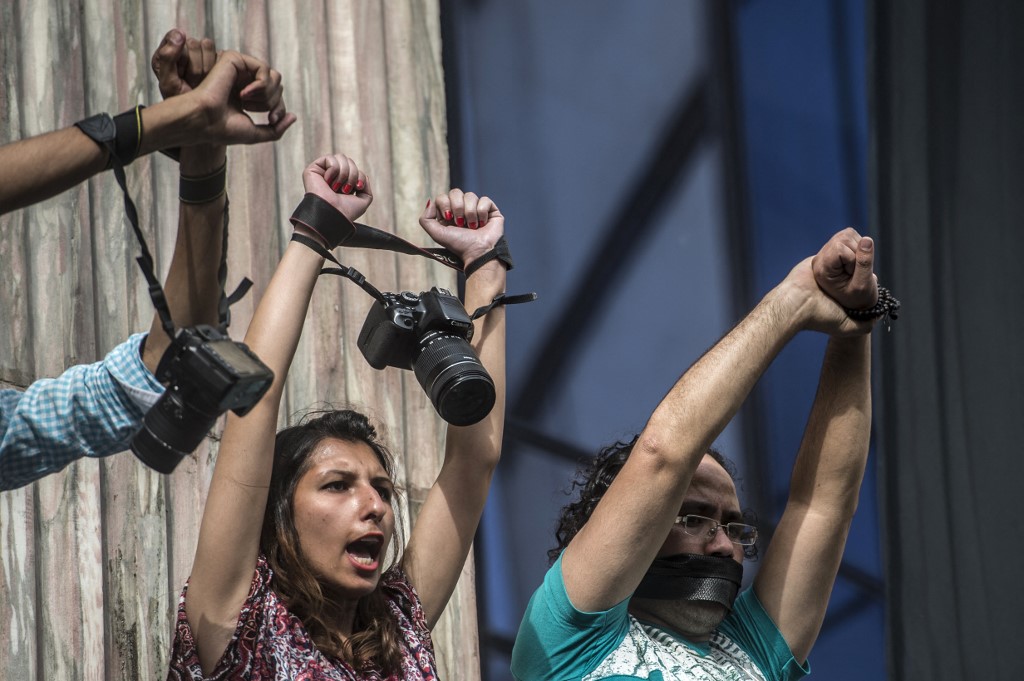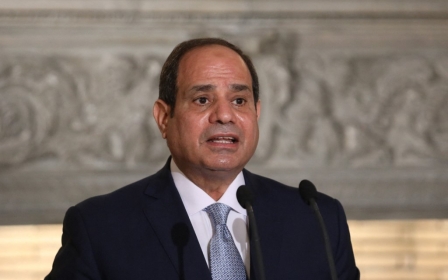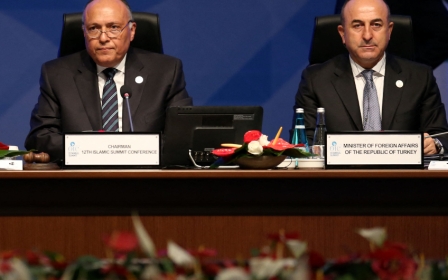Are Egypt's jailed journalists becoming pawns in their union's election game?
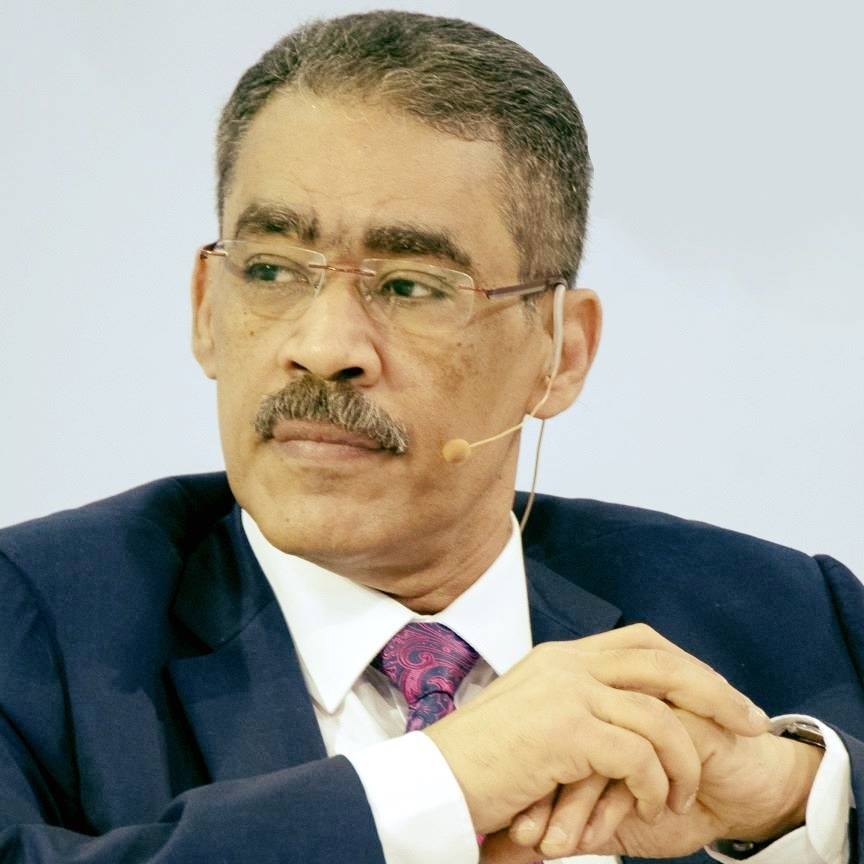
Egyptian free speech advocates are expressing concern that the fate of detained media professionals is being used as a campaigning card ahead of the midterm elections of the Journalists' Syndicate, the independent guild of the nation's newspaper writers.
"Some of the candidates are putting pressure on the government to release the journalists put in jail on fabricated and laughable charges," Amr Badr, the head of the Committee on Freedoms at the syndicate, told Middle East Eye.
Several journalists, held in pre-trial detention, were released earlier this month at an initiative by Diaa Rashwan, the outgoing head of the Journalists' Syndicate, who is campaigning for a second two-year term at the saddle of the union.
'The journalists deserve to have a syndicate that defends their freedoms'
- Khaled el-Balshi, a journalist running for a syndicate board seat
The move was viewed as a gesture of support from the government to Rashwan against his competitors ahead of the elections.
Instead of boosting Rashwan's credentials, however, the move raised controversy and opened the door for debates on whether the freedom of the journalists is becoming an electoral campaigning card.
New MEE newsletter: Jerusalem Dispatch
Sign up to get the latest insights and analysis on Israel-Palestine, alongside Turkey Unpacked and other MEE newsletters
On 19 March, journalists will elect half of the 12 members of the board of the syndicate, along with the chairman.
Six journalists, Rashwan included, are vying for the top seat in the union, along with 55 others who are competing for the six board seats up for grabs in the elections.
Each of the candidates promises a long list of perks to members should they win.
One of the candidates promises to give his colleagues Covid-19 vaccine shots.
Another says he will give members discounts on public transport fares.
Nevertheless, other candidates are promising to bring the syndicate back to its past strengths, namely by defending the freedoms of journalists.
"The journalists deserve to have a syndicate that defends their freedoms," left-wing journalist Khaled al-Balshi, who is running for a board seat, told MEE. "There is an urgent need for changing the laws that trim freedoms."
Pawns in the game
There is no official estimate of the number of journalists now in jail in Egypt.
Sayed Abu Zeid, the syndicate's lawyer, says there has been an upsurge in the number of journalists in jails in recent years.
"Most of the journalists are imprisoned because they write on social media or surpass the limits of criticism," Abu Zeid told MEE. "We are keen to attend interrogations and help the families of the imprisoned journalists."
The Arabic Network for Human Rights Information has documented the cases of 33 journalists who are still behind bars in the country.
'Their release for cheap electoral considerations is a humiliation to the government'
- Anwar al-Hawary, journalist
Most of them have been charged with joining terrorist groups and publishing false news, but have yet to be referred to trial.
A handful of these journalists were released on 7 March, a few hours after Rashwan broke the news on his Facebook page.
Nonetheless, their release stirred up debates on whether jailed journalists are becoming pawns in the Journalists' Syndicate's electoral game.
Some journalists criticised the move and called for bringing those who imprison the nation's journalists to account.
Renowned publisher Hisham Kassem said he does not share other journalists' joy at the release of the prisoners.
"The prisons burst at the seams with journalists," Kassem wrote on Facebook.
Renowned journalist Anwar al-Hawary said unlawful detentions of citizens are a humiliation to Egyptians.
"Their release for cheap electoral considerations is a humiliation to the government," he wrote on Facebook on 8 March.
Controversial candidate
Rashwan, who doubles as the head of the State Information Service, lashed out at those questioning his motivations.
"This is not a coincidental effort aiming at making gains that can be used in electoral battles. It is a continual duty that has to be carried out at all times, regardless of the position I occupy," he wrote on Facebook.
He mentioned the names of some of the journalists he helped release as chairman of the Journalists' Syndicate in the past two years.
Rashwan said he mandated the legal affairs section at the syndicate to follow up on the cases of jailed journalists.
Syndicate legal representatives attended 64 interrogation sessions at the public prosecution as well as 79 court sessions in solidarity with the journalists, he said
He noted that the syndicate had also sent tens of requests to the public prosecutor to release the journalists.
However, the more Rashwan defends himself against these accusations, the more he raises controversy about his electoral bid.
A political researcher who headed local think tank Ahram Center for Political and Strategic Studies before, Rashwan's re-election bid has provoked fears that he is seeking to strengthen the government's grip on the media industry.
During Rashwan's two years as head of the syndicate, more journalists were put in jail than in the last decade, some journalists pointed out.
The syndicate, a traditional haven for free speech, is also showing hostility to the journalists under him.
This is why Rashwan is facing stiff opposition from the journalists, especially junior ones who campaign for a union that defends free speech and the dignity of its members.
"The journalists should not vote for Rashwan again," journalist Basma Tharwat told MEE. "Someone else needs to get the chance to lead this important union."
Media freedom muzzled
The latest releases of detained journalists has brought the perilous nature of the journalistic profession in Egypt into sharp focus.
More and more journalists go to jail as the margin of freedom allowed by the authorities keeps shrinking.
The Egyptian government, observers say, wants to control the media narrative and shows intolerance to media people who dare to challenge official accounts about what is happening in this country.
"The jailing of journalists is tantamount to an abuse of the law," human rights lawyer Negad al-Borai told MEE. "Dozens of journalists and bloggers are in jail for expressing their opinions."
By the nature of their ownership, state-owned newspapers are fully controlled by the government.
The nation's private newspapers and TV channels are also controlled by companies and businessmen known to be mere fronts for state agencies, including Egyptian intelligence.
The Egyptian government also blocks hundreds of websites, leaving little space for free speech.
Egyptian authorities are also believed to be using the ongoing fight against terrorism as a means to crack down on opposition journalists.
They are also using the Covid-19 pandemic in muzzling the media, especially those trying to throw light on different aspects of the crisis in Egypt.
In March 2020, Egyptian authorities forced the correspondent of the Guardian out of Egypt for writing a report suggesting that the number of Covid-19 patients and deaths in Egypt could be much higher than officially reported.
A few months later, health authorities said actual infections and deaths could be ten times higher than the numbers officially registered.
In May 2020, the State Information Service, the official PR agency of the Egyptian government which is responsible for licensing the work of foreign correspondents, threatened the correspondents of the New York Times and the Washington Post against quoting unofficial sources.
Nevertheless, Rashwan stands a big chance of winning the elections.
Some journalists pin hopes on him using his contacts to increase financial support for journalists, especially a monthly allowance from the government to help the journalists meet their training requirements.
In a way this highlights the desperate financial conditions faced by Egypt's journalists.
The monthly allowance is now the equivalent of $129. It was $96 before Rashwan took over two years ago.
Small as it may seem, this allowance is about the entire income of some journalists, especially those whose news organisations have gone bankrupt, closed down or stopped paying them their salaries.
Some of the 10,000 members of the syndicate also expect Rashwan to use the same connections in securing the release of journalists still behind bars.
Middle East Eye delivers independent and unrivalled coverage and analysis of the Middle East, North Africa and beyond. To learn more about republishing this content and the associated fees, please fill out this form. More about MEE can be found here.


